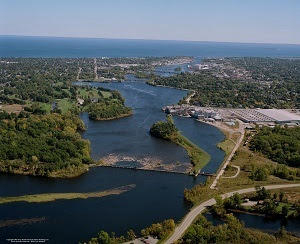Michigan: Cleanup improves health of Upper Peninsula’s Menominee River

A recent cleanup effort along a stretch of the Menominee River is expected to boost fish and environmental health in the area as the river recovers.
The Menominee River forms the boundary between the northeast corner of Wisconsin and the southern tip of Michigan’s Upper Peninsula, with headwaters originating in both states and eventually emptying into Green Bay.
Federal Environmental Protection Agency and state specialists from Michigan and Wisconsin helped Lower Menominee River communities clean up the river by removing contaminants left by historic industry use, including manufactured gas, ship-building, paper and wastewater treatment companies. Great Lakes Restoration Initiative funds supported the cleanup.
“Restoration of sites like these makes an incredible difference for Great Lakes communities and natural habitat, as well as the outdoor recreation opportunities they support,” said Office of the Great Lakes Director Jon Allan. “Together, we’re achieving the goal of swimmable, fishable, drinkable waters that everyone can enjoy.”
The environmental effects of that historic pollution had earned the lower 3 miles of the Menominee River designation as an “Area of Concern” under the 1987 Great Lakes Water Quality Agreement. The residual impact of the release of coal tar, paint sludge and arsenic from those businesses led to serious ecological impairments for many area communities.
Thanks to cleanups like this, positive changes are happening. Michigan originally was tagged with 111 ecological impairments, which are defined as damage to the environment that keeps the ecosystem from properly functioning. This cleanup triggered the removal of Michigan’s 48th impairment from that original list. Office of the Great Lakes staff expect the Menominee River’s last two impairments, regarding fish and wildlife habitat and populations, to be lifted soon.
Although restoration of this site is almost complete, there is still much work needed to address environmental damage in Michigan. People can get involved in AOC cleanups through local Public Advisory Councils that work in partnership with Office of the Great Lakes coordinators.
At this time, advisories regarding quantities and species of fish remain and are updated by the Michigan Department of Health and Human Services. Properly cleaned and cooked panfish are considered best choices for eating.






